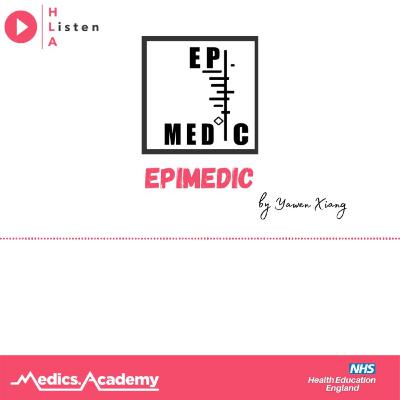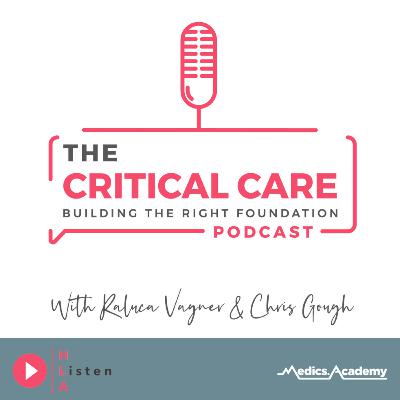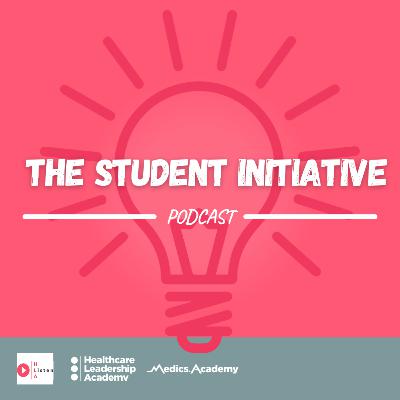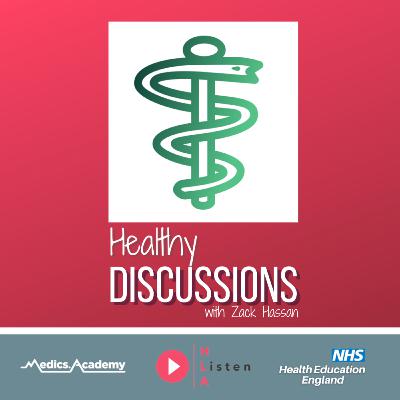Discover HLA Listen
HLA Listen

HLA Listen
Author: HLA Listen
Subscribed: 6Played: 83Subscribe
Share
© HLA Listen
Description
The HLA is approved by The Institute of Leadership & Management, is a certified
member of Social Enterprises UK, and is
commissioned by Health Education England North East and Health Education England
South West. The HLA partners with Medics.Academy and through Medics.Academy its programme is accredited by the Medical School at the University of Central Lancashire. The HLA is also supported by University College London’s Academic Careers Office.
47 Episodes
Reverse
This episode will cover the concept of chance in statistics using the example of DNA evidence in criminal courts.
The HLA is approved by The Institute of Leadership & Management, is a certified member of Social Enterprises UK, and is commissioned by Health Education England North East and Health Education England South West. The HLA partners with Medics.Academy and through Medics.Academy its programme is accredited by the Medical School at the University of Central Lancashire. The HLA is also supported by University College London’s Academic Careers Office.
2016 was an important year for politics. Two world-changing events happened: EU referendum (or Brexit) and the US presidential election. The results of both events came as a surprise to nearly everyone who had been following the opinion polling closely. It is believed that selection bias played a role in influencing the results. This episode will cover the concept of bias in statistics.
The HLA is approved by The Institute of Leadership & Management, is a certified member of Social Enterprises UK, and is commissioned by Health Education England North East and Health Education England South West. The HLA partners with Medics.Academy and through Medics.Academy its programme is accredited by the Medical School at the University of Central Lancashire. The HLA is also supported by University College London’s Academic Careers Office.
On 12 January 2016, junior doctors took part in a general strike across the NHS in England for the first time since 1975. At the centre of the dispute was the weekend effect. The ex-health secretary, Jeremy Hunt, had repeatedly use this effect to back his push for 24/7 NHS and the new junior doctor contract in 2016. This episode will explore the concept of weekend effect and how its research is complicated by confounding factors.
The HLA is approved by The Institute of Leadership & Management, is a certified member of Social Enterprises UK, and is commissioned by Health Education England North East and Health Education England South West. The HLA partners with Medics.Academy and through Medics.Academy its programme is accredited by the Medical School at the University of Central Lancashire. The HLA is also supported by University College London’s Academic Careers Office.
Testing for covid-19 comes with many benefits, but no test is 100% sensitive and specific. This episode will explain the concept of sensitivity and specificity using the example of covid-19 testing.
The HLA is approved by The Institute of Leadership & Management, is a certified member of Social Enterprises UK, and is commissioned by Health Education England North East and Health Education England South West. The HLA partners with Medics.Academy and through Medics.Academy its programme is accredited by the Medical School at the University of Central Lancashire. The HLA is also supported by University College London’s Academic Careers Office.
This episode focuses on the process of drug development using the example of the Covid 19 vaccine. It will also provide the listeners with a walkthrough of the phase 3 trial of the Pfizer-BioNTech vaccine. The study type of randomised controlled trials will be briefly explored.
The HLA is approved by The Institute of Leadership & Management, is a certified member of Social Enterprises UK, and is commissioned by Health Education England North East and Health Education England South West. The HLA partners with Medics.Academy and through Medics.Academy its programme is accredited by the Medical School at the University of Central Lancashire. The HLA is also supported by University College London’s Academic Careers Office.
This episode will introduce the listeners to the study of Epidemiology. Epidemiology is the study of distribution (including frequency and pattern), risk/ protective factors and interventions (including diagnosing and management) of diseases. 3 historical stories (Dr John Snow and cholera, Dr Percival Pott and scrotal cancer and Dr James Lind and scurvy) will be used to further explained the study areas.
The HLA is approved by The Institute of Leadership & Management, is a certified member of Social Enterprises UK, and is commissioned by Health Education England North East and Health Education England South West. The HLA partners with Medics.Academy and through Medics.Academy its programme is accredited by the Medical School at the University of Central Lancashire. The HLA is also supported by University College London’s Academic Careers Office.
Join Raluca (ICU Nurse) and Chris (ICU Consultant) in looking after Mary, a (hypothetical) patient who has been in ICU for a week following a cardiac arrest.
We are looking at reducing sedation and assessing Mary’s neurology. Join us in discussion:
Sedation? What is this and what medications we may use?
Pain relief: what and why?
How to assess neurology: GCS, RASS and CAM-ICU
Delirium and its management.
We mention research around GCS:
Glasgow Coma Scale: Teasdale, G. and Jennett, B. (1974) 'Assessment of coma and impaired consciousness’, The Lancet, 2 (7872), pp.81-84.
Green, S.M. (2011) ‘Cheerio, Laddie! Bidding Farewell to the Glasgow Coma Scale’, Annals of Emergency Services, 58(5), pp. 427-430.
Reith FC, Synnot A, van den Brande R, Gruen RL, Maas AI (2017) ‘Factors Influencing the Reliability of the Glasgow Coma Scale: A Systematic Review.’, Neurosurgery, 1;80(6), pp: 829-839. doi: 10.1093/neuros/nyw178.
Ramazani, J. and Hosseinei, M. (2019) ‘Comparison of Full Outline of Unresponsiveness Score and Glasgow Coma Scale in Medical Intensive Care Unit’, Annals of Cardiac Anaesthesia, 22(2), pp. 143-148,
Wolf, C., Wijdicks, E., Bamlet, W., McLelland, R. (2007) ‘Further validation of the FOUR score coma scale by intensive care nurses’ in Mayo Clinic Proceedings, 82(4) pp.435-438
Main debate: how useful do you find these assessment tools? Drop us a message…
Don’t miss our three takeaway messages and please send us yours!
Enjoy the episode!
Raluca Vagner- Intensive Care Nurse @RalucaVagner
Chris Gough- Intensive Care Consultant @GoughC
Bianca, our hypothetical patient, gets admitted from the ward with severe diarrhoea and a potassium of 7.5.
Join Raluca (ICU Nurse) and Chris (ICU Consultant) in discussing:
What is “renal failure”
How to prepare for this admission
Treatment options for Bianca
Renal Replacement theory: the principles
Don’t miss our three takeaway messages and please send us yours!
Enjoy the episode!
Raluca Vagner- Intensive Care Nurse @RalucaVagner
Chris Gough- Intensive Care Consultant @GoughCJ
Cara (our hypothetical patient) develops hypovolaemic shock following a laparotomy.
Join Raluca (ICU Nurse) and Chris (ICU Consultant) in a discussion about:
What do we want to know from the handover?
What is the management of hypovolaemic shock?
Blood product and their importance
Major Haemorrhage protocol
My (Raluca) lightbulb moment: Hb may not always drop enough to indicate a bleeding – find out why!
Don’t miss our three takeaway messages and please send us yours!
Enjoy the episode!
Raluca Vagner- Intensive Care Nurse @RalucaVagner
Chris Gough- Intensive Care Consultant @GoughCJ
Join Raluca (ICU Nurse) and Chris (ICU Consultant) in admitting and looking after our hypothetical patient Vincent who has presented to hospital in septic shock.
We will talk about:
Types of shock
How to prepare for this admission
How to manage a patient with septic shock
Use of vasoactive medication
Literature and research mentioned in the podcast:
Sepsis Guidelines: https://sepsistrust.org/
And much more. Give away – the patient always gets better!
Don’t miss our three takeaway messages and please send us yours!
Enjoy the episode!
Raluca Vagner- Intensive Care Nurse @RalucaVagner
Chris Gough- Intensive Care Consultant @GoughCJ
We are following Robert’s continuous deterioration which leads to him being intubated. Join Raluca (ICU Nurse) and Chris (ICU consultant) to discuss more:
When do we intubate?
Is intubation risky?
Overall principles of a ventilator (main modes and settings)
Doctors and nurses working together in intubating a patient
Weaning off the intubation
“failed extubation” or is it really a failure?
Literature and research discussed:
Difficult Airway Society: https://das.uk.com/guidelines/icu_guidelines2017
Ventilation strategies: https://litfl.com/ardsnet-ventilation-strategy/
Human Factors: https://litfl.com/lessons-from-the-bromiley-case/
Don’t miss our three takeaway messages and please send us yours!
Enjoy the episode!
Raluca Vagner- Intensive Care Nurse @RalucaVagner
Chris Gough- Intensive Care Consultant @GoughCJ
In this episode, Raluca (ICU Nurse) will be talking to Chris (ICU consultant) about a hypothetical patient called Robert who was admitted with an exacerbation of COPD.
Join us to find out more about:
-Type 1 and Type 2 Respiratory Failure
-What to get ready at your bedspace for this admission
-What you may want to get from the handover
-Escalation of treatment
-Use of Non-Invasive Ventilations
Research mentioned:
British Thoracic Society: https://www.brit-thoracic.org.uk/
NICE: https://pathways.nice.org.uk/pathways/chronic-obstructive-pulmonary-disease/exacerbations-of-copd#content=view-node:nodes-oxygen-therapy
Guidelines COPD, NIV: https://www.brit-thoracic.org.uk/quality-improvement/guidelines/niv/
Don’t miss our three takeaway messages and please send us yours!
Enjoy the episode!
Raluca Vagner- Intensive Care Nurse @RalucaVagner
Chris Gough- Intensive Care Consultant @GoughCJ
Sarah Wong and Tina Plowman are two medical students who have been involved with organising the decolonising the medical curriculum movement at UCL. Last year they set up a facebook group, using the platform to organise regular discussions and roundtable talks, alongside students from other medical schools, discussing topics around racism, health inequalities and concepts around decolonisation in healthcare. In this episode they talk more about the work they are involved in, the purpose of the decolonising movement and put forward some solutions on ways to improve the medical curriculum today.
Twitter: @decolonisingmed
Facebook: Decolonising the Medical Curriculum (https://www.facebook.com/groups/decolonisingmed )
Email: decolonisingmed@outlook.com
"Shantanu Kundu is a medical student at the University of Liverpool and founder of the Be Free Campaign, a charity that works across the country delivering workshops and holding street campaigns in the hope to demolish the stigma behind mental health. His organisation also works with Youtubers and influencers to promote positive mental health via their audience. Shantanu’s services to charity and commitment to helping the lives of others, resulted in him receiving the Diana awards in 2020, the highest accolade a young person can achieve for humanitarian effort and social action.
In this episode we discuss why mental health is so important to talk about, the impact of COVID on students' mental health and the roles universities have to play in looking after their wellbeing.
@shantanuknd
@campaignbefree
www.shantanukundu.com
www.befreecampaign.org
"
Rebecca Lennox is a second year nursing student at John Moores University and alumni of the #150 Leaders Student Programme. Believing there was a huge gap in the care and treatment of people from the Deaf community, Rebecca and her colleague introduced British Sign Language classes for university staff and students, enlisting the help of a charity called Deaf Active. Demand for places were so high that now Rebecca is pushing for Sign Language classes to be on the curriculum for all nursing students. In this episode, she talks more about her campaign and the importance of learning British Sign Language. We also discuss the relationship between medical students and nurses and how we can encourage greater collaboration between the two fields.
@StnBecca2
YouTube: Becca Lennox
https://www.deafactive.org/
James Frater is the co-founder of a social enterprise the Ladder Project, and the African and Caribbean Student Lead of King’s College London Widening participation programme. He is also part of Imperial's inaugural Black Students Advisory Panel and sits on the Youth Advisory Council for the Foundation for Education Development. To top it all off he is recognised as being one of the most outstanding students in the UK by Future Leaders, Rare Recruitment and The Association of Jamaican Nationals. And this is all while still being a medical student at Kings College London University. In this episode, we discuss all things around access to medicine, improving diversity, forging partnerships and if BAME really is the right term to use. Website: www.jamesfrater.com Twitter: @jb100__ Instagram: jbbb100 LinkedIn: https://www.linkedin.com/in/james-frater/
Hammad Jeilani is the director and co-founder of a company called Apian, a healthcare startup that is using drones to improve access to healthcare in a faster and environmentally friendly manner. Hammad is also a NHS clinical entrepreneur, a programme run by NHS England aimed to develop the next generation of leaders to help transform our healthcare system. And on the side he is also a medical student at Barts and The London School of Medicine and Dentistry. In this episode we discuss Hammad's journey in setting up Apian, the potential that drones have in transforming healthcare delivery and if medical education today is truly reflective of the changing nature of the healthcare in the UK.
Apian: www.apian.aero
Twitter & Instagram handles: @apianaero
LinkedIn: https://www.linkedin.com/company/apian
Rafia Miah is a final year medical student at the University of Southampton. She has been involved in numerous organisations and last year received a scholarship to be a part of the Healthcare Leadership Academy. Passionate about women’s health she has recently set up an organisation called Amar Doctor, meaning my doctor, an initiative specifically targeted towards Bengali women in the UK which aims to provide educational seminars on a variety of different health-related topics.
In this episode, we discuss why Bangladeshi women historically have the poorest health outcomes in the UK and strategies to address this issue. Rafia also shares her journey in setting up Amar Doctor, the importance of mentorship and ways to seek opportunities whilst in medical school.
Twitter: rafia_miah
LinkedIn: rafia-miah
Instagram: rafiamiah
https://www.healthpioneerscharity.com/amar-doctor
This is a special episode where Raluca (ICU Nurse) is joined by Chris Gough, Intensive Care Consultant and Owen Gustafson, Intensive Care Physiotherapist.
We all talk about our experiences of going through a pandemic and the different challenges and successes we’ve encountered.
This is a fun conversation, but also a hard one. We share our worries, stresses, concerns and hoped for the future.
We leave you on a positive note, with food for thought: what three things would you change/implement/continue in your area of practice that can make the NHS the best place to work? Share your thoughts in the comments section.
Don’t miss our three takeaway messages and please send us yours!
Enjoy the episode!
Guests:
Raluca Vagner- Intensive Care Nurse @RalucaVagner
Chris Gough - Intensive Care Consultant; twitter handle: @GoughCJ
Owen Gustafson - Intensive Care Physiotherapist; twitter handle: @OxfordICUPhysio
Dr Lade Smith CBE is Director of Forensic Services at South London and Maudsley Foundation Trust and 2019's Psychiatrist of the Year. Her background as an intensive care forensic psychiatrist has given her insight into the stories of family psychological trauma that are prevalent amongst the UK's violent offenders. She is also an advocate for race equality and has published research examining racial disaprities in the use of detention orders under the Mental Health Act. Zack and Lade discussed how criminality and mental illness can be traced back to adverse childhood experiences, the need for early intervention, and the role doctors should play in changing policy and preventing discrimination.
Links
Lade's Twitter - @DrLadeSmith
Lade's Book recommedations - Ray Bradbury and Margaret Atwood
Music - Overriding Concern by Kevin MacLeod
Link: https://incompetech.filmmusic.io/song/4187-overriding-concern
License: http://creativecommons.org/licenses/by/4.0/
About the host
Zack Hassan is a junior doctor based in Edinburgh and a Healthcare Leadership Academy Scholar. His podcast hosting combines his experience of debating at the Cambridge Union with insights from the NHS front-line.
Twitter – @MontereyZack
Zack's LinkedIn
Our Supporters
The Healthcare Leadership Academy has a mission to inspire the next generation of healthcare leaders. They have lots of opportunities on their website for a variety of health professionals, including through HLA Listen, their podcasting channel.
Health Education England North East and Health Education England South West support the podcast by sponsoring HLA Listen.
Medics.Academy is an online platform which provides technology enhanced learning solutions for organisations and individuals.








